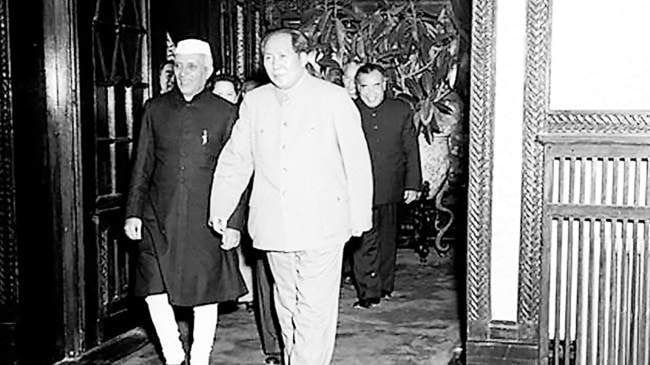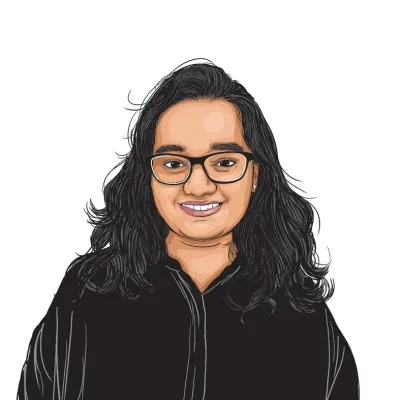Opinion When Nehru first met Mao, discussed the United States as a shared concern: ‘The US is not mature…’
Jawaharlal Nehru visited Mao Zedong in China in 1954, becoming the first Indian PM and the first non-Communist foreign leader to do so. The New York Times then quoted Nehru as saying that he regarded the trip “as the most important foreign mission of his life”.
 PM Jawaharlal Nehru with Chinese Communist Party Chairman Mao Zedong in Beijing in 1954. (Wikipedia)
PM Jawaharlal Nehru with Chinese Communist Party Chairman Mao Zedong in Beijing in 1954. (Wikipedia) Prime Minister Narendra Modi recently visited Tianjin, China, in what was his first trip to the country in seven years. Several commentators viewed the uncertainties brought on by the Donald Trump administration as having pushed the two nations to deepen their relationship. While not the only factor, the global political context becomes difficult to ignore when countries deal with one another, even when they are neighbours.
This was witnessed even in the first official visit by an Indian Prime Minister to China, where the Communists had come to power in 1949. Amid the emergence of Cold War rivalries, India was the first non-Communist nation to accord diplomatic recognition to China in 1950.
It was perhaps natural, then, for Jawaharlal Nehru to visit Mao Zedong in China in 1954, becoming the first non-Communist foreign leader to do so. The New York Times then quoted Nehru as saying that he regarded the trip “as the most important foreign mission of his life”.
Nehru arrived in China on October 19. In his book, Nehru’s Bandung, author Andrea Benvenuti wrote that Indira Gandhi also accompanied her father.
“Anxious to project an image of a peaceful, friendly and dynamic China, CCP (Chinese Communist Party) leaders rolled out the red carpet… Chinese leaders viewed Nehru’s visit to China as part and parcel of their charm offensive towards the Third World,” he wrote.
Mao and Nehru engaged in wide-ranging discussions about colonial rule (Britain in India, and China witnessing unequal European trade treaties and Japanese rule), Asian politics, the United States, and more.
On October 19, their first meeting was held at the Zhongnanhai, a complex in Beijing that houses government offices. Mao began by underlining their commonalities: “China was bullied by Western imperialist powers for over 100 years. Your country was bullied even longer, for more than 300 years… In spite of differences in our ideologies and social systems, we have an overriding common point, that is, all of us have to cope with imperialism.”
He noted that several problems were yet to be addressed: “Taiwan is still in the hands of the US” and “the level of our industrial development is lower than that of India…”. Nehru concurred on the subject of colonisation and reiterated the need to follow the Five Principles (Panchsheel) on mutual respect for sovereignty and non-aggression. The agreement had been signed just a few months before their meeting, and was also invoked in Tianjin recently.
While he had a more positive view of Europe than Mao, Nehru shared his critical assessment of the US. Mao said, “It (the US) has advanced its defence lines to South Korea, Taiwan, and Indo-China, which are so far away from the US and so close to us. This makes our sleep unsound.”
Nehru said, “The US is not mature. It is very difficult for the US to understand the many things that it dislikes and, at the same time, are happening in the world.”
In the meeting on October 23, another point of divergence emerged on the question of future global wars, which Mao viewed according to Communist principles: “If another war is fought, the bulk or whole of West Asia and Africa and the whole of Latin America will shake off imperialism.”
Nehru argued, “Sometimes the result of a war is good, such as leading to people’s liberation and testing people’s capacities for endurance. But it can also cause human beings to become more brutal and thus downgraded. Therefore, on every count, war has to be avoided by every possible effort.”
Finally, Mao said, “There is no tension between China and India. Our two countries do not wage psychological warfare…”.
The October 23 meeting was also attended by V V Paranjpe, who served as an interpreter during the visit and would later be appointed as an Indian diplomat. Decades later, he recalled the difficulties of the job, given the complexities of the Chinese language and his unfamiliarity with Mao’s “very strong” regional accent.
During the visit, the Mayor of Shanghai held a special musical evening in Nehru’s honour, where the announcer spoke of a “young and talented musician who had returned from the US”.
Paranjpe wrote that the announcer referred to the musician by the Chinese third personal pronoun “Ta”, which is the same word used for “he”, “she” or “it”. “Not knowing the musician, I translated ‘ta’ as ‘he’, but soon the curtain went up to reveal a very pretty female musician. Nehru, hardly able to contain his anger, turned to me and said, ‘You have been referring to the musician as a man, actually it is a woman. What kind of Chinese do you know?’.”
Paranjpe also wrote about his “most unforgettable memory” — when Mao bid Nehru farewell. “We were in Zhongnanhai… Mao escorted Nehru all the way to his car. While shaking Nehru’s hand, he suddenly came out with two lines from the Chinese classical poet, Qu Yuan. Quoting him, Mao said: ‘There is no greater sorrow than the sorrow of departing alive. There is no greater joy than the joy of (a) first meeting’.”
“Upon Nehru’s return to India it (the visit) created a cloud-burst of friendly feelings for the Chinese… During his return visit to India in 1956, (Chinese Premier) Zhou Enlai received a tumultuous welcome with skies reverberating with the lilting notes of “Hindi, Chini Bhai-Bhai”. This was perhaps the golden period of India-China relations,” he wrote.
It was not to last. An uprising against Chinese rule in Tibet led to the 14th Dalai Lama fleeing and seeking refuge in India in 1959, emboldening Chinese suspicions of India attempting to influence Tibet. The 1962 war further dealt a major blow, with Nehru criticised for not anticipating the threat from China. After 1954, the next visit by an Indian PM to China would only happen more than three decades later, with Nehru’s grandson Rajiv Gandhi.
The writer is Deputy Copy Editor, The Indian Express



